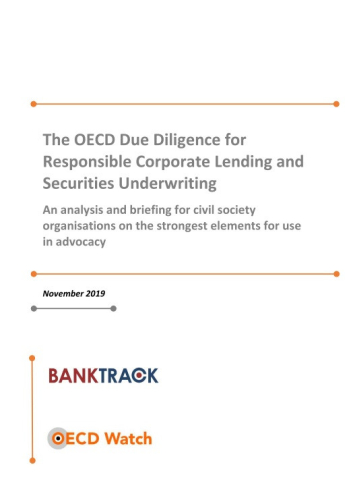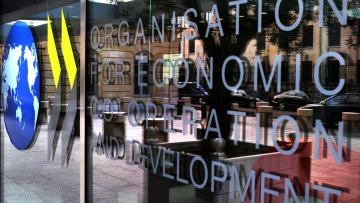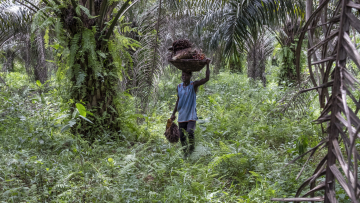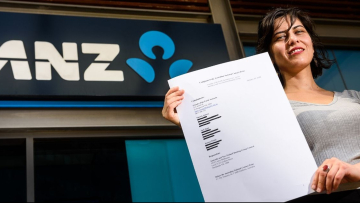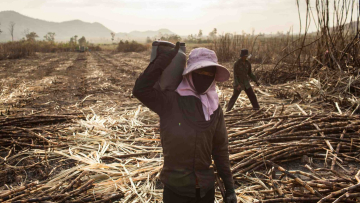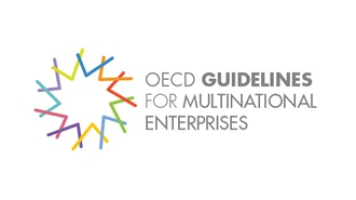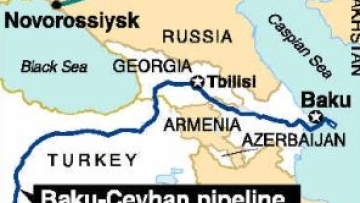Banks and the OECD Guidelines
Ryan Brightwell ryan@banktrack.org

Ryan Brightwell ryan@banktrack.org
The OECD Guidelines
The OECD Guidelines for Multinational Enterprises on Responsible Business Conduct ("The OECD Guidelines") are recommendations from governments to multinational enterprises on responsible business conduct around the world. They define standards for socially and environmentally responsible corporate behaviour and establish a grievance mechanism procedure to address complaints between corporations and the communities or individuals negatively affected by corporate activities. The Guidelines are adhered to, by 51 countries (all 38 OECD member states and 13 other adhering states (as of January 2025) and are largely aligned with the UN Guiding Principles on Business and Human Rights.
The OECD published a new "targeted update" to the Guidelines in June 2023, with OECDWatch (a network of which BankTrack is a member) describing the net result as positive. The updates align the Guidelines with the Paris Agreement and include a new recognition of the corporate responsibility to support a just energy transition and ensure the respect of human rights defenders. OECDWatch also criticised the failure of the update to take the opportunity to improve the implementation of the Guidelines through the National Contact Point (NCP) mechanisms.
National Contact Points
The OECD Guidelines establish a unique complaint procedure (or “Specific Instance Procedure”) in the form of National Contact Points (NCPs). Every government that adheres to the Guidelines is required to establish an NCP to promote the OECD Guidelines and handle complaints against companies that have allegedly failed to adhere to the Guidelines’ standards. For details, advice, and support in making use of the complaint procedure see the OECD Watch page on Filing OECD Guidelines complaints.
Due Diligence and Financial Sector Guidance
In addition to the Guidelines, the OECD published ‘Due Diligence Guidance for Responsible Business Conduct’ in May 2018 to provide practical support to multinational enterprises on the implementation of the OECD Guidelines. OECD Watch commended the Guidance. The OECD has also published sector-specific guidance which helps enterprises identify and address risks to people, the environment and society associated with business operations, products or services in particular sectors.
BankTrack served as an Advisory Group member to the OECD project on Responsible Business Conduct (RBC) in the Finance Sector, a multi-stakeholder project which elaborated guidance for the finance sector on the implementation of the OECD Guidelines. This project delivered guidance for RBC for institutional investors in March 2017; for corporate lending and securities underwriting in October 2019, and for project and asset finance transactions in October 2022. BankTrack provided comments on draft documents and participated in regular Advisory Group calls and meetings. The guidance elaborates on the OECD Guidelines and represents an important step forward in encouraging responsible conduct by financial sector actors. BankTrack and OECDWatch produced an analysis of the 2nd guidance paper in November 2019. In particular, the guidance clarifies that banks providing loans and underwriting services can contribute to adverse human rights and environmental impacts through both actions and omissions; and that banks can take steps to promote greater transparency with respect to client relationships without being in breach of duties around client confidentiality; and it sets out how and why banks should establish and/or participate in grievance mechanisms.
BankTrack and the OECD Guidelines
BankTrack participated in the 2023 consultation for the update of the Guidelines, in support of better safeguards for human rights and environmental defenders and improved consideration and protection of the rights of Indigenous peoples. BankTrack was a member of the Advisory Group to the OECD Project for Responsible Business Conduct in the Financial Sector (2015 to 2022) to encourage higher standards in implementing the OECD Guidelines for Multinational Enterprises. As part of this, we provided input on its three guidance papers for Institutional Investors (2017), Corporate Lending and Underwriting (2019) and Project Finance (2022). In 2019 we published a briefing paper with OECD Watch summarising areas where the Corporate Lending guidance paper had made important progress.
In addition to this, BankTrack has engaged with National Contact Point (NCP) complaints against financial institutions through giving advice to communities and civil society organisations.
- In 2017 we brought a climate change-related complaint alongside other organisations to the Dutch NCP
- We supported the complaint against ANZ in Australia – which in 2021 led to the development of the first clearly elaborated grievance mechanism in the banking sector as well as remedy for victims;
- In 2021 we sought guidance on nominee shareholdings following a complaint against UBS.
- In January 2024, alongside two partners, we filed a complaint to the NCPs of Switzerland and the UK against Swiss-based banks UBS and Swiss National Bank and UK-based banks Barclays and HSBC. The Swiss NCP accepted the complaint against banking giant UBS for its investment holdings in U.S. private prison contractors CoreCivic and GEO Group. The assessments of the three other joint complaints are still forthcoming.
- In February 2024, the Philippine Movement for Climate alongside BankTrack and two other organisations filed a complaint to the UK NCP against Standard Chartered for contributing to human rights violations and failing to provide remediation for harms caused by four coal plants it co-financed in the Philippines.
We maintain the following reference pages on OECD complaints:

